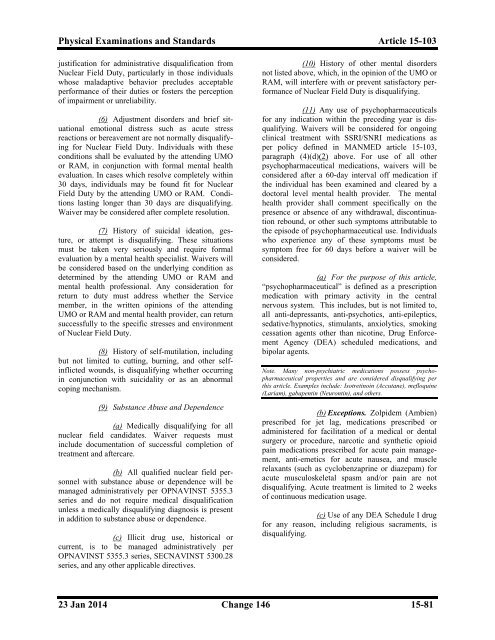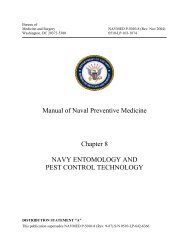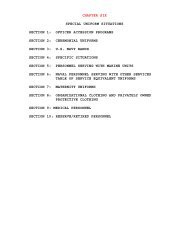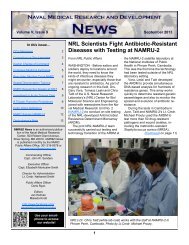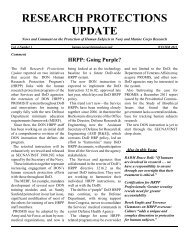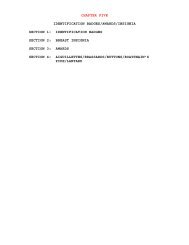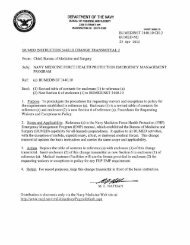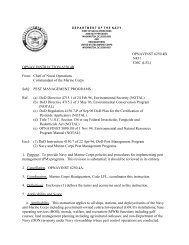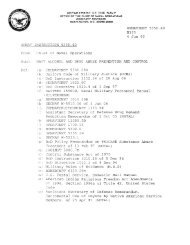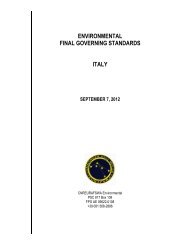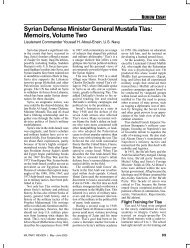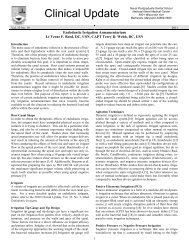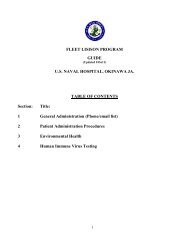Change 146 Manual of the Medical Department ... - Navy Medicine
Change 146 Manual of the Medical Department ... - Navy Medicine
Change 146 Manual of the Medical Department ... - Navy Medicine
You also want an ePaper? Increase the reach of your titles
YUMPU automatically turns print PDFs into web optimized ePapers that Google loves.
Physical Examinations and Standards Article 15-103<br />
justification for administrative disqualification from<br />
Nuclear Field Duty, particularly in those individuals<br />
whose maladaptive behavior precludes acceptable<br />
performance <strong>of</strong> <strong>the</strong>ir duties or fosters <strong>the</strong> perception<br />
<strong>of</strong> impairment or unreliability.<br />
(6) Adjustment disorders and brief situational<br />
emotional distress such as acute stress<br />
reactions or bereavement are not normally disqualifying<br />
for Nuclear Field Duty. Individuals with <strong>the</strong>se<br />
conditions shall be evaluated by <strong>the</strong> attending UMO<br />
or RAM, in conjunction with formal mental health<br />
evaluation. In cases which resolve completely within<br />
30 days, individuals may be found fit for Nuclear<br />
Field Duty by <strong>the</strong> attending UMO or RAM. Conditions<br />
lasting longer than 30 days are disqualifying.<br />
Waiver may be considered after complete resolution.<br />
(7) History <strong>of</strong> suicidal ideation, gesture,<br />
or attempt is disqualifying. These situations<br />
must be taken very seriously and require formal<br />
evaluation by a mental health specialist. Waivers will<br />
be considered based on <strong>the</strong> underlying condition as<br />
determined by <strong>the</strong> attending UMO or RAM and<br />
mental health pr<strong>of</strong>essional. Any consideration for<br />
return to duty must address whe<strong>the</strong>r <strong>the</strong> Service<br />
member, in <strong>the</strong> written opinions <strong>of</strong> <strong>the</strong> attending<br />
UMO or RAM and mental health provider, can return<br />
successfully to <strong>the</strong> specific stresses and environment<br />
<strong>of</strong> Nuclear Field Duty.<br />
(8) History <strong>of</strong> self-mutilation, including<br />
but not limited to cutting, burning, and o<strong>the</strong>r selfinflicted<br />
wounds, is disqualifying whe<strong>the</strong>r occurring<br />
in conjunction with suicidality or as an abnormal<br />
coping mechanism.<br />
(9) Substance Abuse and Dependence<br />
(a) <strong>Medical</strong>ly disqualifying for all<br />
nuclear field candidates. Waiver requests must<br />
include documentation <strong>of</strong> successful completion <strong>of</strong><br />
treatment and aftercare.<br />
(b) All qualified nuclear field personnel<br />
with substance abuse or dependence will be<br />
managed administratively per OPNAVINST 5355.3<br />
series and do not require medical disqualification<br />
unless a medically disqualifying diagnosis is present<br />
in addition to substance abuse or dependence.<br />
(c) Illicit drug use, historical or<br />
current, is to be managed administratively per<br />
OPNAVINST 5355.3 series, SECNAVINST 5300.28<br />
series, and any o<strong>the</strong>r applicable directives.<br />
(10) History <strong>of</strong> o<strong>the</strong>r mental disorders<br />
not listed above, which, in <strong>the</strong> opinion <strong>of</strong> <strong>the</strong> UMO or<br />
RAM, will interfere with or prevent satisfactory performance<br />
<strong>of</strong> Nuclear Field Duty is disqualifying.<br />
(11) Any use <strong>of</strong> psychopharmaceuticals<br />
for any indication within <strong>the</strong> preceding year is disqualifying.<br />
Waivers will be considered for ongoing<br />
clinical treatment with SSRI/SNRI medications as<br />
per policy defined in MANMED article 15-103,<br />
paragraph (4)(d)(2) above. For use <strong>of</strong> all o<strong>the</strong>r<br />
psychopharmaceutical medications, waivers will be<br />
considered after a 60-day interval <strong>of</strong>f medication if<br />
<strong>the</strong> individual has been examined and cleared by a<br />
doctoral level mental health provider. The mental<br />
health provider shall comment specifically on <strong>the</strong><br />
presence or absence <strong>of</strong> any withdrawal, discontinuation<br />
rebound, or o<strong>the</strong>r such symptoms attributable to<br />
<strong>the</strong> episode <strong>of</strong> psychopharmaceutical use. Individuals<br />
who experience any <strong>of</strong> <strong>the</strong>se symptoms must be<br />
symptom free for 60 days before a waiver will be<br />
considered.<br />
(a) For <strong>the</strong> purpose <strong>of</strong> this article,<br />
“psychopharmaceutical” is defined as a prescription<br />
medication with primary activity in <strong>the</strong> central<br />
nervous system. This includes, but is not limited to,<br />
all anti-depressants, anti-psychotics, anti-epileptics,<br />
sedative/hypnotics, stimulants, anxiolytics, smoking<br />
cessation agents o<strong>the</strong>r than nicotine, Drug Enforcement<br />
Agency (DEA) scheduled medications, and<br />
bipolar agents.<br />
Note. Many non-psychiatric medications possess psychopharmaceutical<br />
properties and are considered disqualifying per<br />
this article. Examples include: Isotretinoin (Accutane), mefloquine<br />
(Lariam), gabapentin (Neurontin), and o<strong>the</strong>rs.<br />
(b) Exceptions. Zolpidem (Ambien)<br />
prescribed for jet lag, medications prescribed or<br />
administered for facilitation <strong>of</strong> a medical or dental<br />
surgery or procedure, narcotic and syn<strong>the</strong>tic opioid<br />
pain medications prescribed for acute pain management,<br />
anti-emetics for acute nausea, and muscle<br />
relaxants (such as cyclobenzaprine or diazepam) for<br />
acute musculoskeletal spasm and/or pain are not<br />
disqualifying. Acute treatment is limited to 2 weeks<br />
<strong>of</strong> continuous medication usage.<br />
(c) Use <strong>of</strong> any DEA Schedule I drug<br />
for any reason, including religious sacraments, is<br />
disqualifying.<br />
23 Jan 2014 <strong>Change</strong> <strong>146</strong> 15-81


